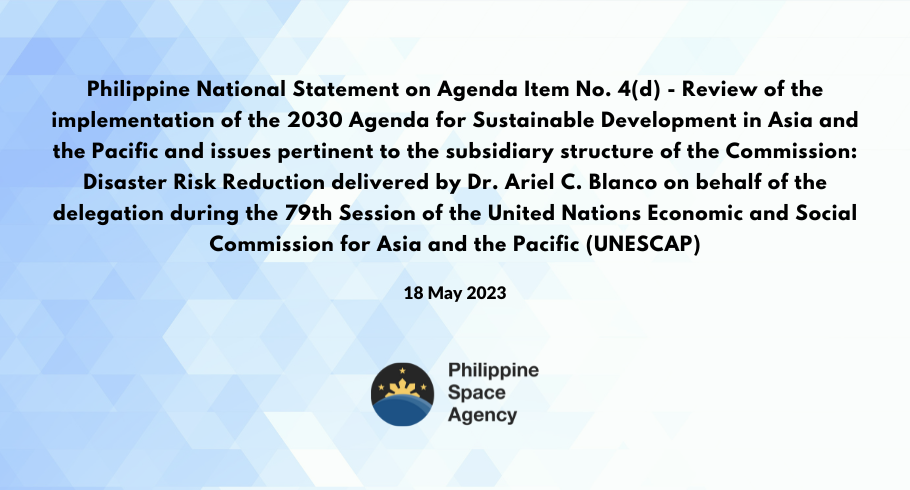79th SESSION OF THE UNITED NATIONS ECONOMIC AND SOCIAL COMMISSION FOR ASIA AND THE PACIFIC (UNESCAP)
PHILIPPINE NATIONAL STATEMENT
AGENDA 4(d): REVIEW OF THE IMPLEMENTATION OF THE 2030 AGENDA FOR SUSTAINABLE DEVELOPMENT IN ASIA AND THE PACIFIC AND ISSUES PERTINENT TO THE SUBSIDIARY STRUCTURE OF THE COMMISSION: DISASTER RISK REDUCTION
delivered by:
DR. ARIEL C. BLANCO
DIRECTOR, SPACE INFORMATION INFRASTRUCTURE BUREAU
PHILIPPINE SPACE AGENCY (PhilSA)
Madam Chair,
The Philippines extends its appreciation to Ms. Armida Salsiah Alisjahbana, and to the dedicated staff of the Economic and Social Commission for Asia and the Pacific (ESCAP) for the remarkable work done during the course of her leadership.
The Philippines, as a member of the global space community and an emerging space capable nation, reaffirms its commitment to promote and enhance disaster risk reduction (DRR) efforts. Under the DRR Committee in ESCAP, the Philippines has committed to improving its disaster resilience, preparedness, and response capacities through various programs, such as community-based disaster risk reduction, capacity building, and early warning systems.
Madam Chair,
The Philippines strongly believes in the need for regional cooperation mechanisms for strengthening disaster risk management and resilience-building. Such mechanisms facilitate the sharing of best practices, resources, and expertise, leading to more effective and efficient disaster response and recovery efforts. We are pleased to share with you that the Philippines benefited from these cooperation agreements and mechanism. In response to the Mindoro oil spill, the Philippine Space Agency requested the assistance of Sentinel Asia and the request was escalated to the activation of the International Charter: Space and Major Disasters. With this, space agencies and commercial companies from different countries were able to contribute satellite data for mapping and monitoring the extents of the oil spill over time for more than a month. The generated and shared data and information have been utilized by various Philippine government agencies in assessing environmental and socio-economic impacts.
Madam Chair,
In the future, the Philippines, through the Philippine Space Agency, may consider and expand its reach to cover other important aspects such as but not limited to Regional cooperation for multi-hazard disaster risk reduction and mitigation, climate adaptation, and resilience; Integrated multi-hazard risk assessment, preparedness, early warning and response to disaster risks, including mitigating cascading risks related to biological and other natural hazards, including through the use of innovative technology tools; and, finally disaster information management and multi-hazard early warning
The Philippines strongly believes in international cooperation as a mechanism to collectively improve and develop our capabilities in the various sectors and sub-sectors benefiting from remote sensing and its applications.
In closing, the Philippines as an emerging space-capable nation, remains committed to support the Commission’s efforts in utilizing space science and technology as a mechanism to achieve and realize the Sustainable Development Goals for the benefit of the current and future generation.
Thank you, Madam Chair.




